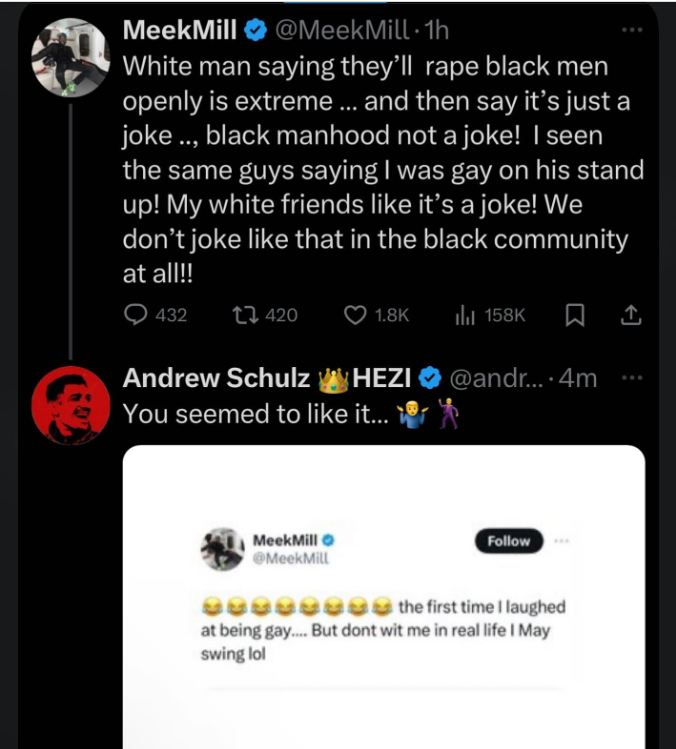Comedian Andrew Schulz is facing fierce criticism following a controversial rant about Kendrick Lamar on his podcast, Flagrant. The controversy stems from a comment Schulz made in response to Kendrick’s new album GNX, where the Compton rapper seemingly calls out a “white comedian” making jokes about Black women. Schulz’s subsequent remarks have sparked outrage online, drawing attention from high-profile figures like Meek Mill, who quickly fired back on social media.
Here's ads banner inside a post
The Rant That Sparked Outrage
In a recent episode of his podcast, Schulz took issue with Kendrick Lamar’s lyrics from the song wacced out murals. The line, “Don’t let no white comedian talk about no Black woman, that’s law,” appeared to be a pointed response to Schulz, who had previously made jokes about Black women in his comedy routines. Schulz, never one to back down from controversy, responded by accusing Kendrick of hypocrisy and pointing out moments in the rapper’s career where he had worked with individuals accused of wrongdoing. He even went so far as to make a disturbing joke, claiming that he could “rape” Kendrick Lamar, w
Schulz’s comments quickly became a hot topic online, sparking intense backlash. His attempt to defend himself by framing his comments as “just a joke” only seemed to fuel the outrage further, with many users arguing that some lines should never be crossed, especially when it comes to sensitive topics like sexual assault.
Meek Mill Speaks Out
One of the most notable responses came from rapper Meek Mill, who took to X (formerly Twitter) to voice his displeasure with Schulz’s remarks. Meek called Schulz’s joke about “raping Black men” extreme and offensive, particularly when framed as humor. “White man saying they’ll rape black men openly is extreme … and then say it’s just a joke … black manhood not a joke!” Meek wrote. He went on to clarify that such jokes do not resonate with the Black community, adding, “We don’t joke like that in the black community at all!!”
Here's ads banner inside a post
Meek’s response highlighted a larger issue surrounding the comedian’s actions, particularly how humor can often cross boundaries in ways that are damaging. Meek, who has publicly faced his own challenges with the justice system, made it clear that jokes about such serious topics could never be acceptable in his community.
Schulz Fires Back at Meek Mill
Not one to remain silent in the face of criticism, Andrew Schulz quickly responded to Meek Mill’s comments with a tweet of his own. He shared a screenshot from a previous post by Meek, in which the rapper had laughed at jokes about his own sexuality. “The first time I laughed at being gay…. But don’t wit me in real life I may swing lol,” Meek had written. Schulz captioned the post with, “You seemed to like it,” implying that Meek had been more comfortable with certain jokes in the past.
While this exchange between Schulz and Meek Mill brought attention to the issue, it also sparked further discussions about the ethics of comedy and the limits of free speech, especially when it comes to sensitive topics like race, gender, and sexuality. Schulz’s attempt to defend himself by pointing to Meek’s past comments only seemed to exacerbate the situation, with critics accusing him of deflecting the focus away from his own inappropriate remarks.
Here's ads banner inside a post
Widespread Criticism of Schulz’s Behavior
Meek Mill wasn’t the only one to call out Schulz for his controversial remarks. Many social media users also voiced their disapproval, with some even labeling him a “weird ass” for the comment. O’Shea Jackson Jr., the son of rapper Ice Cube, joined the conversation by calling Schulz’s actions “weird” and stating that the comedian had “changed for the worse.”
It’s clear that Schulz’s recent comments have left a sour taste in the mouths of many who feel that he crossed a line in his attempt at humor. Critics argue that there are limits to what can be joked about, and when those lines are crossed, it’s not just about being offensive—it’s about perpetuating harmful ideas and undermining serious issues.
The Larger Debate Over Comedy and Boundaries
The backlash against Andrew Schulz is part of a broader conversation about comedy, free speech, and the boundaries of humor in the modern age. While many comedians argue that comedy should be a space for pushing limits and challenging taboos, others believe that some jokes, particularly those about sensitive issues like race, gender, and sexual assault, are harmful and perpetuate negative stereotypes.
Schulz’s comments have sparked a debate about whether jokes about such topics should ever be acceptable, especially when they involve marginalized groups. As more people, including high-profile figures like Meek Mill, speak out against the comments, the comedian is left to face the consequences of his words and the fallout from a public that is increasingly unwilling to tolerate harmful humor.
Looking Ahead: What’s Next for Andrew Schulz?
As the public backlash continues to grow, Andrew Schulz will likely face further scrutiny in the coming weeks. While he has defended his remarks as jokes, it’s clear that not everyone is laughing. For many, this controversy is a reminder of the power of words and the responsibility that comes with using comedy as a platform to address serious issues. The comedian’s next move may determine whether he can repair his reputation or if the fallout from this incident will have lasting consequences on his career.


